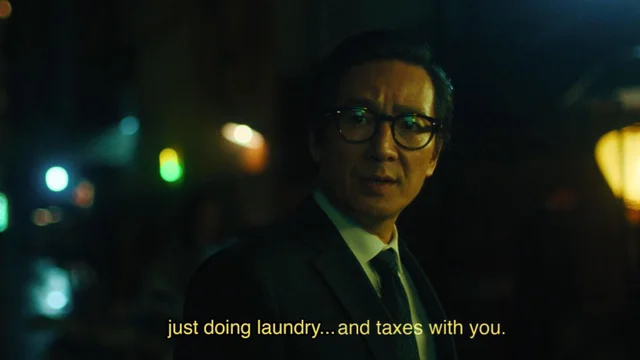The plot of Everything Everywhere All At Once is of characters hopping across the multiverse, a classic science fiction trope that literalises the What If concept that often drives the genre. Its filmmaking is melodramatic and hyperkinetic yet deeply controlled; an early sign of where things are going style-wise is when its heroine slides her footstool across the ground, perfectly landing it in place and within the shot. Its story is that of a woman who has reached middle age with a sense of bitterness and disappointment at how things have turned out, only to discover a universe of infinite possibility. All three things come together into something deeply profound – like many great stories, reaching what every other member of its genre has been trying to get to since its inception. EEAAO dives into the pleasures of the multiverse as fast as it possibly can; it makes the sensible decision to characterise its heroine, Evelyn, and her world before immediately messing with it through alternate realities. The fantasy that turning down the wrong street would get us rescued by a martial artist who teaches us how to become so powerful we can beat people up with our pinkies? Classic genre element.
It pushes down on the idea hard enough to reach a fundamental truth of the genre: one would not fantasise about alternate realities if one were not disappointed with one’s actual reality in some way. There are usually two obvious conclusions to this. The first is that one’s reality is the worst of all universes – one has made only the most banal and tedious decisions and it would take a literal breaking of reality to escape it. Most multiverse stories have this as subtext and maybe even sometimes pull it out as text in the climax; EEAAO pulls it out in maybe the second act, interrogating how pathetic and depressing its heroine’s life is. Missed opportunities, bad decisions. This allows it to explore the second truth: that perhaps it would be better not to dream of alternate worlds at all. HP Lovecraft would approve of the idea that too much knowledge of how the universe works can leave one feeling powerless and meaningless in the grand scheme of things. Opening Joy’s mind up to the infinite possibility has left her an amoral force.
This is where everything comes together. The entire plot has been driven by Evelyn quite literally drawing strength from visions of her alternate selves; implicit in this that one could have done it before and therefore with enough will one could do it now. But it goes even further. The alternate universes keep coming back, even and especially ones that seemed like one-off jokes. From the movie’s perspective, they are genuine stories with their own weight and power in which having made one decision does not stop one from having to make more decisions. In terms of absurdism, my favourite is the Racaccoony story, which starts out as a simple gag riffing on Evelyn’s mispronounciation of ratatouille, then reflects her bitterness at the meaningless of the world when that version of her destroys her coworker’s life for no real reason, then reflects her finding joy by showing that version of her rescuing her coworker’s raccoon. This is contextualised through editing to have the exact same weight as every other story in the film, from Hot Dog Fingers World to Singer World to Evelyn’s true reality.
Sometimes people say that dreaming of other realities is a completely worthless endeavor. That we exist in one reality, that once you make a decision it negates all the other possibilities, and that one should focus on that one to the exclusion of all others. Not only have I never found this to be an effective solution to decision paralysis, if anything it has made things worse. Everything Everywhere All At Once suggests instead that our capacity for imagination means all the other universes do exist – that we can draw strength from them, that we can learn from them, and that we can use them to create happiness in this reality. The things Waymond says in the Singer World have become the movie’s most iconic lines, and like many iconic lines, I found them far more powerful in context. It’s the reality in which Waymond never got to keep Evelyn in his life, and it’s the only one in which he got to become a cool guy who wears a stylish suit and gets to smoke cinematically. It’s a convincing cinematic argument to never be bitter no matter how things turn out, because it’s always possible to extract joy no matter what your situation, because it’s always possible to dream of that other world for a little while, and because one of those worlds is dreaming of you. All versions of us can choose to live alongside each other.

